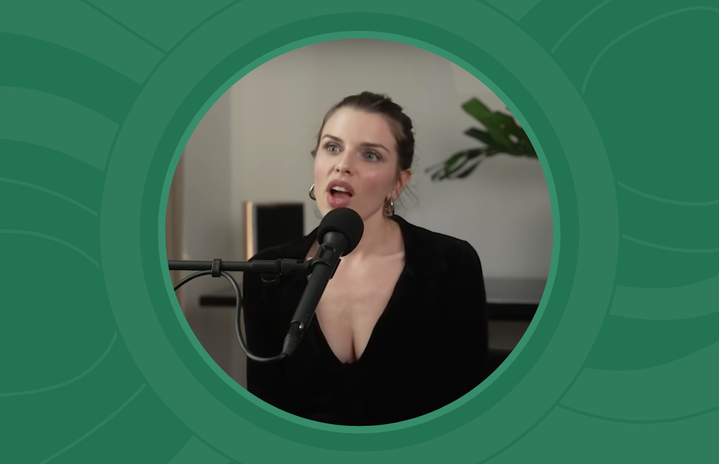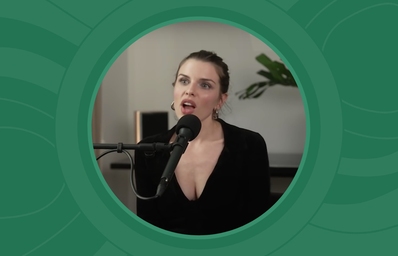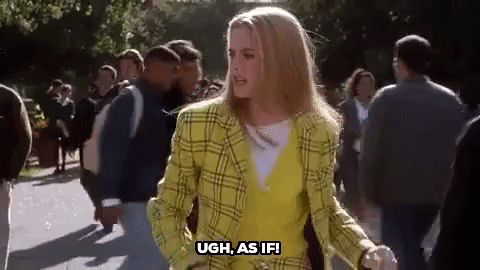Whether she’s being interviewed for live TV or recording a TikTok for her audience of almost 2 million followers, Julia Fox never holds back. “I hate to break it to you, but not being liked by you and your crew of prepubescent incels is a compliment,” she said in a recent TikTok, replying to a hate comment. “It means I’m doing something right.”
Julia Fox’s voice is distinctive in more ways than one. While this TikTok represents the bold and refreshing voice that keeps Fox relevant in today’s fast-paced pop culture landscape, it also captures her literal voice and the controversial vocal fry that comes along with it. Fox speaks with the heavy vocal fry and uptalk that have been the subject of decades of debate concerning stereotypically feminine speech patterns.
Last year, Julia Fox went viral for the quirky way she pronounced “Uncut Gems” on the Call Her Daddy podcast. Her deep, elongated “Uncah Jahms” was a textbook example of vocal fry, the creaky, frying sound that results from speaking at a low register. These days, Fox still uses vocal fry and uptalk—the tendency to add an upward inflection to the end of declarative sentences so that they sound like questions—in her popular TikToks and podcast interviews. These linguistic signatures are the foundations of Valleyspeak, a social dialect we’ve all heard from celebrities like Kim Kardashian and Paris Hilton. Fox, who was raised by working-class parents in New York, shows just how far Valleyspeak has spread from its origins among the upper-middle-class “Valley girls” of Southern California.
Despite making it out of the Valley, vocal fry and uptalk are still associated with the negative characteristics that defined the sexist Valley girl caricature. A 2021 study found that job candidates with vocal fry were judged to be less pleasant, competent, hirable, educated and professional than those without. Even worse than their findings were their conclusions. Rather than recommending that job interviewers examine their own discriminatory behavior, the authors of the study concluded that “speech-language pathology graduate students should be cognizant of VF use, as they seek to secure competitive externships and jobs.” This conclusion places the responsibility of preventing discriminatory behavior on the women facing discrimination, rather than prejudiced hiring managers.
The implication that it is a woman’s job to police how she speaks in order to advance in her career is rampant in media. Recent articles like What’s Wrong With My Voice, published by leading women’s magazine Marie Claire, offer women advice on how to change their natural speech patterns in professional settings. What’s Wrong with my Voice reports the expert opinions of a “New York Speech Coach,” who has plenty of valuable tips for women including to “change how your mouth moves” in order to not have such a “shrill” or “piercing” voice and to “think about blowing out candles” to prevent vocal fry.
Asking women to change the way that we speak doesn’t do anything except propagate misogyny. Perceiving women as being unintelligent and materialistic for speaking with vocal fry or uptalk plays into ages-old sexist caricatures, especially considering how men (who speak in naturally lower registers and thus can also speak with vocal fry) do not face the same negative stereotypes.
This double standard gets even worse when men online begin accusing women of “faking” their accents, like in this tweet (by an executive producer at iHeartMedia) reacting to Julia Fox’s “Uncaht Jahms” meme:
“My favorite part of the Julia Fox Uncut Jaahhhms story is that there is an entire generation of people who speak with a phony accent and vocal fry who don’t get what the big deal is.”
–@HiMyNameIsSeton on Twitter
Even taken as a joke, this tweet carries a condescending implication that all women who speak similarly to Fox are too unintelligent to recognize their own “phony” speech patterns. This not only plays into insulting stereotypes of unintelligence, but it also reaches towards an even more sinister accusation that women who speak with vocal fry are intentionally misrepresenting themselves. We see this same accusation in popular memes like “take a woman swimming on the first date” which imply that women who wear a lot of makeup are misleading men in a way that justifies male outrage and eventual abuse of women. By broadly painting a category of women who look or speak a certain way as unintelligent and materialistic— or worse, as calculated liars— these stereotypes hurt women in more ways than one.
Instead of letting this misogyny change the way we speak, some women are leaning into their uptalk and vocal fry as a radical expression of femininity. TikTok influencer Chrissy Chlapeka (@chrissychlapeka) is known for her distinctive vocal fry and uptalk, which she uses to promote her campaign to reclaim the term “bimbo” and embrace hyper-femininity as a form of empowering self-expression. Similarly, TikTok comedian Hannah Jones (@hannahjonescool1) explained in a 2021 interview that her distinctive accent, reminiscent of the mid-Atlantic accent, was a way for her to signal to a female audience and rebel against the male-dominated comedy landscape by fully embracing a theatrical, “hyper-femme” voice.
I refuse to police the way I speak in order to conform to anybody’s idea of who I should be.
But I’m not a social media star, and chances are that you aren’t, either. Does that mean that the rest of us should watch our vocal fry if we want to ace our next interview? I say no. The way that I speak tells the story of my life, from the traces of an accent leftover from a childhood speech impediment to the linguistic quirks I’ve adopted from my ESL mother. I know that I speak with a fair amount of vocal fry and uptalk, but I refuse to police the way I speak in order to conform to anybody’s idea of who I should be.





